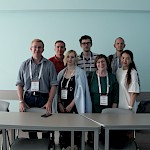The XIII Congress of Anthropologists and Ethnologists of Russia 2019-07-04 07:31:44
Members of the Laboratory for Socio-Anthropological Research and the Department of Anthropology and Ethnology, NGTU (I. V. Nam, K. V. Grigorichev, D. Timoshkin, S. Dzhanyzakova, A. Sadyrin, F. Smetanin, D. Bryazgina) took part in “Family, City and Transboundary Migrants” symposium which was held at the XIII Congress of Anthropologists and Ethnologists of Russia (Kazan), on July 3, 2019. In their reports they presented academic results of the first year of the implementation of the RNF project “The use and creation the urban infrastructure of the Siberian regional capitals by migrants” (project No. 18-18-00293).
I. V. Nam presented the results of field research of the importance of national-cultural autonomies (NCA) for self-organization and adaptation of migrant workers to the receiving environment in Tomsk. The study was based on a comparative analysis of migrants and specialists in the migration field statements and proved the conclusion about the solidarity of these positions because NCA is not a significant institution in the adaptation and integration migrant’s field.
Using case materials of Irkutsk K. V. Grigorichev demonstrated the way of symbolic appropriation of urban space by migrants through the visual appearance and language practices changes which leads to ethnic labeling of migrant localnesses and constructing the dispute of urban space planning.
At the report of D. Bryazgina the study results of the role of “ethnic” Irkutsk markets in constructing the social space processes were presented. Markets are a significant element of the urban structure and everyday life of citizens. Due to D. Bryazgina’s report “ethnic” markets acts as the most important factor in the transformation of social relations in the city.
The report by F. Smetanin studied the significance of the religious factor for the sociocultural adaptation of migrants. F. Smetanin shows that the diversity of Muslim social networks in Tomsk, which include not only mosques and clergymen, but also NSA and other associations are important mechanisms of adaptation of migrant workers.
A. Sadyrin presented pilot results of a virtually unexplored theme - the importance of sport for migrants. Analysis of materials of Tomsk allowed A. Sadyrin to conclude that sport is an important, but not the main part of the migrants' leisure. Sports competitions and organization of sport sections are one of the main activities of NCA, which want to take migrants in various social networks. But in this case such events have a more symbolic meaning.
S. Dzhanyzakova studied the peculiarities and key characteristics of “transnational motherhood” phenomenon. This feature, according to S. Dzhanyzakova, contributes the definition of special interaction practices of migrant mothers with their children in a migration situation.
The speech of D. Timoshkin was focused on the redefinition of “family” and “children” concepts of labor migrants, which are carried out through traditional and digital media. A comparative analysis of news and various forum messages demonstrated the same using and reproduction mechanisms in this process.
The session ended with a lively discussion about the languages used to describe migration in everyday life, and the management process; redefinition of social status of migrants and representatives of the host community in migrant’s tourism practices, and the methodological assumptions and possibilities of using digital sources in anthropological research.
